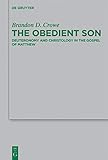The Obedient Son : Deuteronomy and Christology in the Gospel of Matthew / Brandon D. Crowe.
Material type: TextSeries: Beihefte zur Zeitschrift für die neutestamentliche Wissenschaft ; 188Publisher: Berlin ; Boston : De Gruyter, [2012]Copyright date: ©2012Description: 1 online resource (284 p.)Content type:
TextSeries: Beihefte zur Zeitschrift für die neutestamentliche Wissenschaft ; 188Publisher: Berlin ; Boston : De Gruyter, [2012]Copyright date: ©2012Description: 1 online resource (284 p.)Content type: - 9783110279870
- 9783110279917
- 226.2/06
- online - DeGruyter
- Issued also in print.
| Item type | Current library | Call number | URL | Status | Notes | Barcode | |
|---|---|---|---|---|---|---|---|
 eBook
eBook
|
Biblioteca "Angelicum" Pont. Univ. S.Tommaso d'Aquino Nuvola online | online - DeGruyter (Browse shelf(Opens below)) | Online access | Not for loan (Accesso limitato) | Accesso per gli utenti autorizzati / Access for authorized users | (dgr)9783110279917 |
Frontmatter -- Acknowledgements -- Abbreviations -- Table of Contents -- Introduction -- Chapter One: Methodology and Approach -- Chapter Two: The Circulation and Use of Deuteronomy in Ancient Judaism and Christianity -- Chapter Three: Sonship and Obedience in Deuteronomy -- Chapter Four: Sonship and Obedience in Ancient Jewish and Christian Literature -- Chapter Five: Deuteronomic Sonship in Matthew Part 1: Strong and Likely Allusions -- Chapter Six: Deuteronomic Sonship in Matthew Part 2: Significant Possibilities (Matt 3, 17) -- Chapter Seven: Deuteronomic Sonship in Matthew Part 3: Possible Allusions -- Chapter Eight: Conclusions -- Bibliography -- Index of Biblical and Ancient References -- Index of Modern Authors
restricted access online access with authorization star
http://purl.org/coar/access_right/c_16ec
It has often been observed that Jesus’ filial obedience is an important Matthean theme. In this work the author argues that the articulation of Jesus as Son of God in Matthew is significantly influenced by the Deuteronomic concept of obedient sonship.After noting the complexities of Matthew’s use of Scripture – including the subtle ways he engages texts – Deuteronomy’s pervasive influence in ancient Judaism and Christianity is considered. It is argued that the requirement of Israel’s covenantal obedience as God’s son(s) is a major concern in Deuteronomy, as well as in other Jewish and Christian texts that appear to echo Deuteronomy. Indeed, it is argued that a pattern can be detected in which the sonship of Israel is invoked either to summon Israel to obedience, or to rebuke the nation for disobedience.The author concludes that the necessity of Israel’s obedient sonship is an important part of Matthew’s interpretive milieu that derives ultimately from Deuteronomy, and our understanding of Matthean Christology is greatly enhanced when viewed in this context. This study may further help us understand why Matthew’s concern with obedient sonship applies not only to Jesus uniquely, but also to the early Christian community.
Issued also in print.
Mode of access: Internet via World Wide Web.
In English.
Description based on online resource; title from PDF title page (publisher's Web site, viewed 28. Feb 2023)


